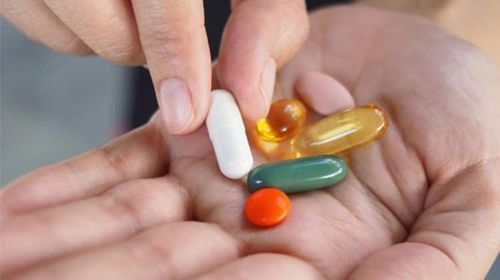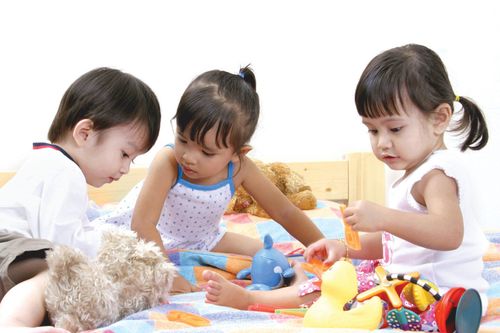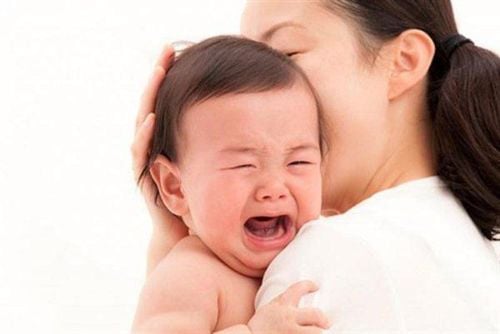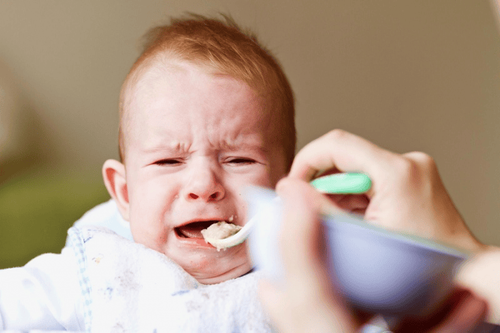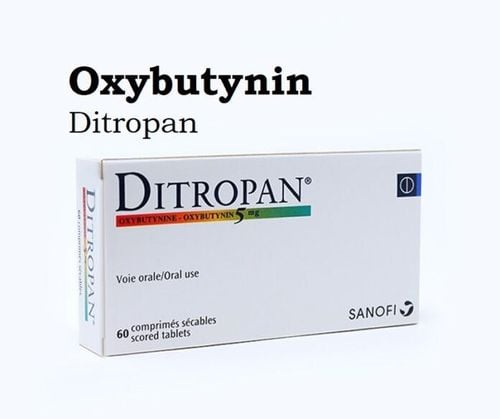This is an automatically translated article.
The article is expertly consulted by Master, Doctor Le Phuc Lien - Urologist - Department of General Surgery - Vinmec Central Park International General Hospital. The doctor has more than 12 years of experience in the field of urology and specialized urology.Most children with low urinary tract infections are indicated for surgery. In order for the surgery to go smoothly and recover quickly, parents or relatives need to pay close attention to the care of the baby with low urinary tract. The following article deals with the care of children with low urinary tract before and after surgery.
1. Children with low urinary tract
1.1 What is the lower urinary tract? Hypogonadism is a congenital abnormality of the penis in which the opening of the urethral opening is on the ventral surface instead of at the tip of the penis. The location of the urinary opening can vary from the glans to the middle of the scrotum and anus. In fact, 1 out of every 300 boys has a low urinary tract.The cause of low urinary tract in children, has been statistically studied due to the abnormal development of the anterior urethra, spongy body, cavernous body and foreskin during pregnancy. In addition, experts also pointed out a number of reasons that cause boys to have low urinary openings:
Defect in epidermal growth factors on the ventral surface of the penis. Vascular defects in the penile region are also the cause of low urinary tract in children. Enzymes have also been reported to be associated with low urinary tract in infants due to deficiency during birth. testosterone synthesis (proximal urethritis). In vitro fertilization is one of the reasons for the increased incidence of low urinary tract in children. 1.2 Classification of diseases in children with low urinary tract
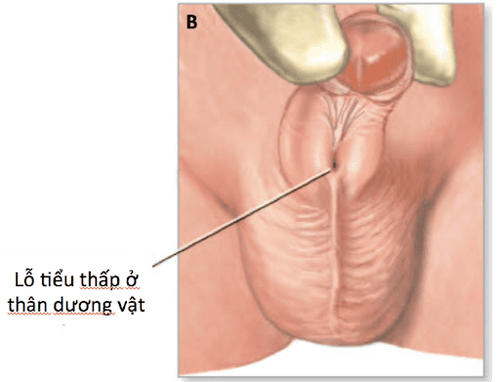
Thông thường ngay sau khi sinh ra bác sĩ đã có thể phát hiện có hay không tình trạng trẻ sơ sinh bị lỗ tiểu thấp
Mild form (Anterior body): Urinary tract in the glans , glans head. Medium body (Middle body): The urinary opening is located in the body of the penis. Severe form (Posterior body): Urinary opening at the base of the penis, scrotum, perineum. Boys with low urinary tracts do not have difficulty urinating, but in some severe cases, they may have to urinate sitting down or have difficulty having sex later on. Children with low urinary tract, if the penis is bent, are very likely to be infertile.
2. Indicated for children with low urinary tract
All cases of children with low urinary tract are indicated for surgery (except for mild cases and straight penis). The ideal time for surgery is from 1-3 years old (the sooner the surgery, the sooner the patient can avoid psychological trauma). Choosing the right time for surgery depends on many factors in which penis size is very important. (In the case of children with low urinary tract, but in children with small penis, surgery will be later). The older the surgery, the more complications.) Currently, in the world, the age to start surgery for children with low urinary tract is 6 months.3. Taking care of babies with low urinary tract
3.1 Before surgery: The doctor clearly explains and distributes the treatment process to the baby's relatives Some necessary tests before surgery for children with low urinary tract are: Blood chart and blood clotting function within 1 week before the day of surgery. For children with low urinary tract and small penis, 3 consecutive doses of testosterone should be given 1-3 weeks apart, ending 1 week before surgery. Karyotype (Chromosome) test in the case of children with severe uraemic with undescended testicles. 3.2 After surgery: After surgery for children with low urinary tract, the baby will be monitored for some symptoms such asSensitivity after anesthesia, general condition, vital signs, mucous membranes. The condition of the incision: Is the bandage soaked with blood, fluid or not, the foreskin is pink or swollen with red-black-red color. Urinary catheterization: Color, nature of urine (turbidity, blood in it), quantity of urine passed. Urinary circulation 5-7 or 10 days depending on the case (severe or mild, surgical technique, early post-operative infection need to remove the tube earlier). The catheter must be placed in a sterile bag with the date and time of insertion. Change the wound dressing after 2-5 days with physiological saline, 2% Betadin, cover or leave it open (depending on the patient's condition and the doctor's instructions).
During the postoperative period, children with low urinary tract will be prescribed some drugs such as antibiotics during catheterization, pain relievers, anti-edematous, spasmolytics, ... so parents or Relatives must closely monitor the baby's condition to know if the baby is affected by the side effects of the drug or not.

Sau khi phẫu thuật, trẻ sẽ được kê 1 số loại thuốc nên cha mẹ cần lưu ý theo dõi để nắm được liệu bé có bị ảnh hưởng bởi tác dụng phụ hay không
Parents are instructed to monitor their baby's incision by observing whether the dressing is soaked with blood, the glans is pink or swollen, and the incision has discharge , pus. Parents were instructed on how to monitor urinary catheterization. Parents were instructed on how to hang the urine bag properly. Feed your baby a diet to avoid constipation. Do not let children with low urinary tract after surgery be too active (running, jumping, playing) Caring for children with low urinary tract after discharge from the hospital:
Parents give prescription drugs, follow-up appointments on time (1 week, 1 day) months, 6 months, 1 year) Re-examination to evaluate results, monitor and handle complications. Parents need to monitor whether children with low urinary tract after surgery have any condition, difficulty urinating, urinary retention, urinary leakage, small-weak urine stream for timely re-examination. Advice from a specialist: Parents need to take their children to an early examination as soon as they are detected and operated early to avoid psychological and physiological sequelae.
As a key area of Vinmec Health system, Pediatrics Department always brings satisfaction to customers and is highly appreciated by industry experts with:
Gathering a team of top doctors and nurses in Pediatrics : consists of leading experts with high professional qualifications (professors, associate professors, doctorates, masters), experienced, worked at major hospitals such as Bach Mai, 108.. Doctors All doctors are well-trained, professional, conscientious, knowledgeable about young psychology. In addition to domestic pediatric specialists, the Department of Pediatrics also has the participation of foreign experts (Japan, Singapore, Australia, USA) who are always pioneers in applying the latest and most effective treatment regimens. . Comprehensive services: In the field of Pediatrics, Vinmec provides a series of continuous medical examination and treatment services from Newborn to Pediatric and Vaccine,... according to international standards to help parents take care of their baby's health from birth to childhood. upon reaching adulthood. Advanced techniques: Vinmec has successfully deployed many specialized techniques to make the treatment of difficult diseases in Pediatrics more effective: neurosurgery - craniofacial surgery, hematopoietic stem cell transplantation in cancer treatment. Professional care: In addition to understanding children's psychology, Vinmec also pays special attention to the children's play space, helping them to have fun and get used to the hospital's environment, cooperate in treatment, improve the efficiency of medical treatment.
Please dial HOTLINE for more information or register for an appointment HERE. Download MyVinmec app to make appointments faster and to manage your bookings easily.




